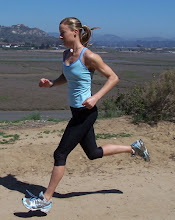
This is a Q&A I had recently with a local amateur triathlete - on staying healthy while training and stretching your limits. You can't continue working hard over time without recovery!
 Left: 3-time Ironman World Champion Chrissie Wellington, speaking to GOTRIbal women, Oct. 2009. For her, training is 24/7 - eating, sleeping, resting, elevating the legs, massage, physical therapy.
Left: 3-time Ironman World Champion Chrissie Wellington, speaking to GOTRIbal women, Oct. 2009. For her, training is 24/7 - eating, sleeping, resting, elevating the legs, massage, physical therapy.
Is there anything in your lifestyle draining your energy? If it’s inadequate sleep, adding 1 hour of sleep/day could make all the difference. If it’s something else, try to identify it and see if you can change it. (For ex. -- I was trying to train while doing immunosuppressant treatments for psoriasis – a dysfunctional imbalance. That was tough to change, b/c it’s a complex problem. But after enough looking and asking experts for help, I found better solutions. If you can’t find the answers yourself, consult a good coach or doctor!)
Re: being sick or immuno-compromised before races -- I found that total rest worked better for me in the 2-3 days before a big race than trying to keep up with remaining workouts.
Q: Just finishing up my first full year of this great sport and I wanted to get some advice from you seasoned athletes. I have never logged so many miles before and I think it gets to me towards the end of my training. The week of wildflower i was sick and now a week before SOMA (half Ironman) I am sick AGAIN!! Frustating! My main question is the miles I still have go this weekend? Should i just relax? Also, how can I try to avoid getting sick before these events? Thank you very much in advance!!!
A: As you build miles or intensity in your training, pay extra attention to recovery: 10-20g protein right after hard workouts, very nutritious food all the time (whole grains, lean proteins, fruits/vegetables), good fueling during workouts, massage (tennis ball, foam roll and stick if you can’t afford to pay), and LOTS of sleep.
If you don’t have enough time at night to sleep, try 30-45-min. naps after lunch or just after work. Reducing overall caffeine and alcohol intake, and stretching/massaging before bed, enhance sleep quality. Alcohol also temporarily suppresses the immune system, and may slow recovery after intense workouts.
Training is a continual process of adapting to physical stressors, so if the balance between work and recovery is off, you’re likely to get sick as soon as you taper or rest. Simply put, if you’re going to work hard, you must also rest well during your hard training.
If you don’t have enough time at night to sleep, try 30-45-min. naps after lunch or just after work. Reducing overall caffeine and alcohol intake, and stretching/massaging before bed, enhance sleep quality. Alcohol also temporarily suppresses the immune system, and may slow recovery after intense workouts.
Training is a continual process of adapting to physical stressors, so if the balance between work and recovery is off, you’re likely to get sick as soon as you taper or rest. Simply put, if you’re going to work hard, you must also rest well during your hard training.
 Left: 3-time Ironman World Champion Chrissie Wellington, speaking to GOTRIbal women, Oct. 2009. For her, training is 24/7 - eating, sleeping, resting, elevating the legs, massage, physical therapy.
Left: 3-time Ironman World Champion Chrissie Wellington, speaking to GOTRIbal women, Oct. 2009. For her, training is 24/7 - eating, sleeping, resting, elevating the legs, massage, physical therapy.Is there anything in your lifestyle draining your energy? If it’s inadequate sleep, adding 1 hour of sleep/day could make all the difference. If it’s something else, try to identify it and see if you can change it. (For ex. -- I was trying to train while doing immunosuppressant treatments for psoriasis – a dysfunctional imbalance. That was tough to change, b/c it’s a complex problem. But after enough looking and asking experts for help, I found better solutions. If you can’t find the answers yourself, consult a good coach or doctor!)
Re: being sick or immuno-compromised before races -- I found that total rest worked better for me in the 2-3 days before a big race than trying to keep up with remaining workouts.
I hope this helps!

No comments:
Post a Comment